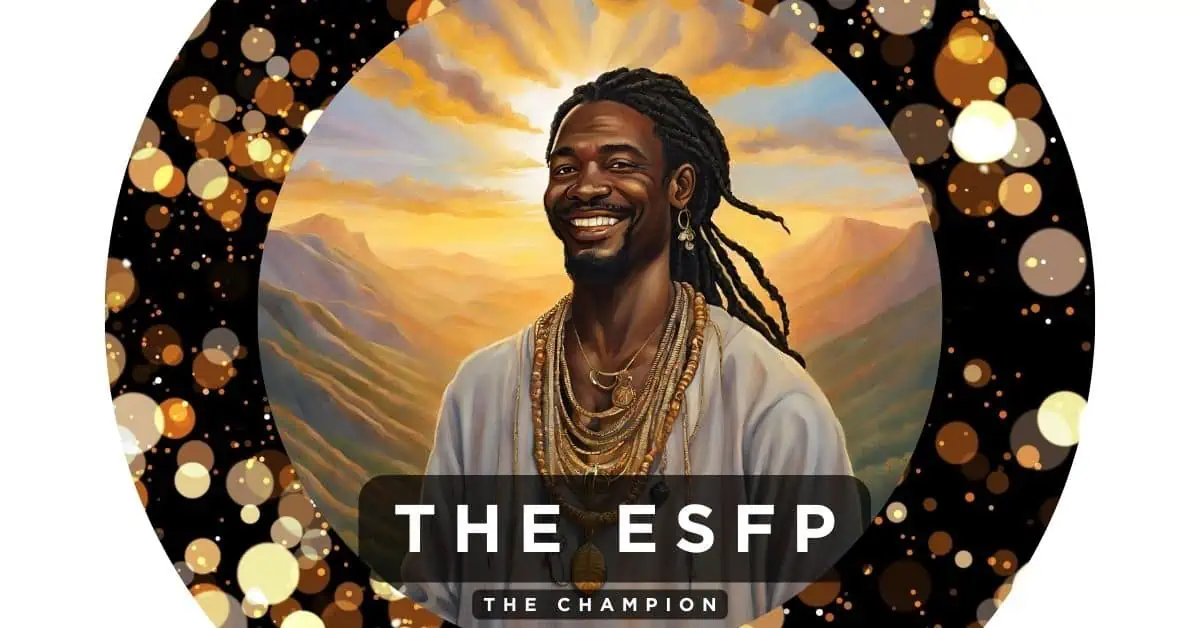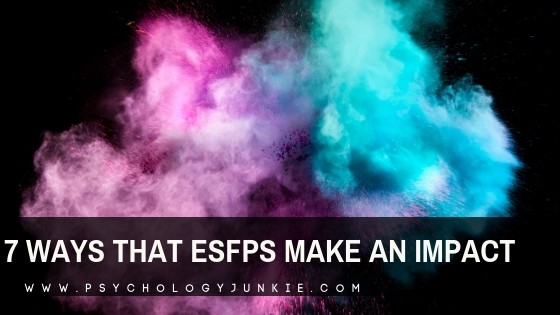ESFP Personality Types
are known for their boundless optimism, their enthusiastic charm, and their ability to bring people together in friendship and celebration. They are often called The Entertainers, and it’s not hard to see why. They love to bring joy and fun into any situation; whether it’s through humor, throwing a party, or just providing cheerful support to friends and family members. The ESFP personality has masterful use of Extraverted Sensing (Se), which means that they are very aware of what’s going on around them and love to celebrate all the sights, sounds, smells, and textures of life. Their auxiliary Introverted Feeling (Fi) gives them a strong set of inner values that they try to live by. They are very compassionate people, who want to make the world a better place for their loved ones. They reach out to people by showing them how to make the most out of each moment without getting bogged down in the past or worrying about the future.
You’ll find a huge variety of famous ESFPs in many career fields; Ronald Reagan, Howard Schultz, Marilyn Monroe, and Quentin Tarantino are just some ESFPs

Want to find out if you’re an ESFP? Take our personality questionnaire or the official MBTI®
What Does ESFP Stand For?
E = Extroversion. ESFPs focus on the outer world of experiences, people, and events, before focusing inwards.
S = Sensing. ESFPs focus more on the concrete, existing world than the world of theories and abstractions.
F = Feeling. ESFPs focus first on their value system and personal ethics when they have to make a decision.
P = Perceiving. ESFPs have a flexible, spontaneous approach to life. They enjoy generating options and tend to mix work with play.
ESFP Motivations and Weaknesses:
Driving Force: To make the most of each moment. To maximize resources and create opportunities. Stay in synch with people and situations in their environment and thrive on trusting their impulses.
Backup Strength: Trust their personal belief and value system, staying focused on what they want for themselves. Skilled at establishing personal bonds with other people.
Weaknesses: Can act too quickly and forget to consider the future implications of their actions. May be logically inconsistent at times.
Stressors: Being overly controlled, confrontation, too much time alone, excessive paper-work or theory, being asked to complete a task without specific instructions, excessive long-term planning.
ESFP Personality Traits:
Everyone has a unique background and lifestyle that shapes them, but most ESFPs have these characteristics in common:
- Ability to act quickly and respond fast to incoming data
- Strong attention to detail
- Vivid, accurate memory of facts and experiences
- A yearning for adventure and excitement
- Focus on the present moment
- Resourceful nature
- Strong sense of individual ethics
- A spontaneous, flexible approach to life
- A down-to-earth, grounded outlook on life
- Ability to “read a room” and sense people’s desires
- Ability to stay calm in crisis situations
ESFP Careers:
ESFPs like to make an impact, so a job that harnesses their creativity, passion, and cleverness is ideal. Whether they’re rapidly assessing someone’s injury in an emergency room or acting on stage, they enjoy responding to their environment and dealing with the unexpected. A lot of routine and predictability will make them bored and listless. They also crave a job that lets them work with friends and gives them a variety of new experiences. Bonus points if those careers utilize their natural aesthetic sense or realistic point of view.
Career Suggestions: Early childhood educator, Athletic coach, Surgeon, Emergency room nurse, Art therapist, Actor, Animator, Dancer, Photographer, Floral designer, Chef, Environmental scientist.
You can find out more here: What You Need (and Despise) in a Career, Based On Your Personality Type
Famous ESFPs:
Bill Clinton, Michelangelo, Richard Branson, Larry Ellison, Howard Schultz, Wayne Dyer, Desmond Tutu, Steven Spielberg, Beyonce, Will Smith, Jamie Oliver, Katy Perry, Nicki Minaj, Justin Bieber, Cameron Diaz, Andy Samberg, Dave Chapelle
Dominant Function: Extraverted Sensing (Se) –
Imagine walking into a room and instantly absorbing every tiny detail: the scent of freshly brewed coffee, the way the sunlight catches the dust in the air, the exact pattern of the bartender’s tattoos. That’s Extraverted Sensing (Se) in action.
ESFPs don’t just exist in the present moment—they devour it. Their brains are like high-speed cameras, snapping up real-world data at a rate that would make most other types dizzy. They’re the ones who will notice that you got a new haircut (before you even sit down) or that the vibe of the party just shifted (ten minutes before anyone else catches on).
Because they rely so heavily on their senses, ESFPs are drawn to experiences that make them feel alive. Skydiving? Yes. Last-minute road trip? Absolutely. Eating tacos from a questionable street vendor at 2 AM? Sounds like an adventure. Okay, maybe not that last one.
Their philosophy is simple: life is meant to be lived, and they plan to squeeze every last drop out of it.
Of course, this present-focus means they’re not exactly futurists. Planning five years ahead? What does that even mean? So much could change between now and then, so what’s the point in wasting time hypothesizing?
They’d rather deal with what’s right in front of them. Some might call this reckless, but to an ESFP, it’s just practical. Why waste time overanalyzing when life is happening right now?
Auxiliary Function: Introverted Feeling (Fi) – The Rebel with a Cause
Deep beneath all that sensory excitement, there’s a quiet, personal world of values and emotions driving the ESFP’s decisions. Enter Introverted Feeling (Fi), the function that ensures that ESFPs don’t just do things—they do things that matter to them.
This is where the ESFP’s strong sense of individuality kicks in. They don’t just go with the flow because someone tells them to. They have their own internal compass, and if something doesn’t sit right with them, they will make their stance clear (often in the form of a dramatic walkout, followed by them texting later, saying they still love you but seriously?).
And let’s talk about their fierce protectiveness over the people they care about. ESFPs have a soft spot for underdogs. If they see someone being mistreated, they’re the first to step in, no hesitation. They’ll stick up for the shy kid in the corner, the friend who’s being underestimated, or even a stranger if they sense injustice. Because for them, it’s not just about what’s happening—it’s about what’s right.
But here’s the catch: they don’t always verbalize what they’re feeling. They might brush off deep emotional struggles with humor, deflect with sarcasm, or drown their sorrows in a new adventure. They feel things deeply—they just don’t always know how to talk about it.
Tertiary Function: Extraverted Thinking (Te) – The Strategist in Disguise
At first glance, ESFPs seem like pure chaos energy—bouncing from one experience to the next, making spontaneous decisions, embracing the unknown. But lurking beneath the surface is their tertiary function, Extraverted Thinking (Te), which gives them a surprising knack for efficiency and problem-solving.
You might not think of an ESFP as a planner, but watch them when they’re running a project they care about. Suddenly, they’re all about execution: lists, schedules (loosely followed, but still), and strategies to get things done. If they decide they want to make something happen—whether it’s organizing an event, starting a business, or simply gathering a group for a night out—they can get surprisingly tactical.
Te also plays a role in how they receive love and support. They adore people who help them organize their big, messy ideas. If you sit down with an ESFP and actually listen to their plans—help them map things out, suggest actionable steps—they will adore you forever. Nothing makes them feel more understood than someone saying, “That’s a great idea! Here’s how you can make it happen.”
Of course, Te is still a tertiary function, which means it doesn’t always show up in the most refined way. Sometimes ESFPs will get caught up in proving a point just for the sake of it. Sometimes they’ll try to bulldoze through problems without fully thinking things through. And sometimes, when they’re really excited, they’ll throw out ten different plans, execute none of them, and end up eating ice cream on the couch instead. It happens.
Inferior Function: Introverted Intuition (Ni) – The Chaos Machine
Ah, Introverted Intuition (Ni), the function that ESFPs have a love-hate relationship with. Most of the time, they don’t even notice it’s there. But when it kicks in, oh boy, does it make itself known.
Ni is all about abstract connections, intangible concepts, and long-term implications—basically, all the things ESFPs aren’t naturally dwelling on. On a normal day, they’re too busy living to get lost in existential rabbit holes. But when stress hits? When their usual strategies stop working? That’s when Ni crashes the party like an uninvited guest.
Suddenly, the ESFP who was all about fun and action is lost in an overthinking spiral. What if I’m making all the wrong choices? What if I’m ruining my life? What if everything falls apart? This is the dark side of inferior Ni—it drags ESFPs into a vortex of “what ifs” and worst-case scenarios that feel completely foreign to their usual mindset.
And because they aren’t naturally comfortable with Ni, they don’t really know how to navigate it. So they might panic, withdraw, or make impulsive, dramatic life changes to try and escape the mental fog. (Moving to another country to “start fresh”? Yep, that’s an ESFP-in-crisis classic.)
But here’s the upside: when they do develop Ni, even just a little, it gives them an incredible superpower—the ability to pause and consider deeper insights before they act. It helps them recognize patterns they might have missed, anticipate consequences, and even tap into a more visionary side of themselves. It won’t ever be their favorite function, but with time, they can learn to use it rather than run from it.
Final Thoughts: The ESFP Paradox
ESFPs are walking contradictions in the best way possible. They’re spontaneous yet deeply value-driven, energetic yet introspective, fun-loving yet fiercely loyal. They bring vibrancy to the world while secretly wrestling with emotions they don’t always know how to express. They live for the moment but, under stress, can get trapped in their own heads.
But here’s the thing: the world needs ESFPs. We need their humor, their energy, their ability to remind us that life isn’t meant to be overanalyzed to death. We need their advocacy, their heart, their willingness to stand up for the people and causes they care about. We need their optimism, their courage, and their ability to turn even the most mundane moment into an adventure.
So if you’re an ESFP? Keep being you. The world is better (and way more fun) because of it.










